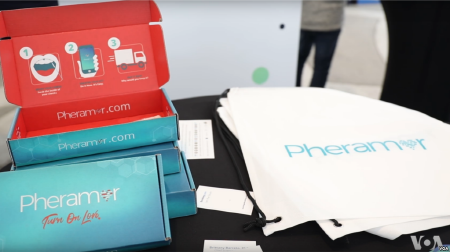
   |
[Headlines] (HL-과학/기술/교육) New Dating App Uses DNA to Help People Find Love
최고관리자 | 18-04-04 20:48

Creators of a new dating app are using people’s genetics to help people find love. They claim that, with tissue from inside someone’s mouth, the app can match people with others they are most likely to find attractive. The company is called Pheramor. The name is a combination of the words “pheromone” -- the small molecules sent from the body and smelled by the people around us -- and “amour”, the French word for love. The company says their app is based on 40 years of research showing there are 11 genetic markers proven by scientists to be "responsible for attraction." Asma Mirza is the company’s chief and co-creator. She said, "Pheramor looks at genetics-based human attraction and social media metadata to help people increase their efficiency of dating.” Rasmus Nielsen is a professor of computational biology and human genetics at UC-Berkeley. He says there are some links between the 11 genetic markers, called MHC type, and attraction. However, it is still difficult to reach a scientific conclusion. "There is some idea that maybe when we mate, we avoid individuals with the same MHC type. And that's what they are basing it on... It's still very, very, very, very controversial as to whether humans can even do this. And there's really very little science into whether it would help us predict mates," Nielsen said. However, Nielsen added that research has shown that mice can recognize DNA that is similar to the DNA of their parents. Mice also know to avoid mating with family members.
* genetics = 유전학/ claim (that ~) = ~이 사실이라고 주장하다/ attractive = 매력적인/ pheromone = 페로몬, 동종 유인 호르몬/ amour = (구식 불어에서) (비밀) 정사(情事), 통정(通情)/ be based on ~ = ~에 기초하다, 근거하다/ genetic marker = 유전적 표지/ metadata = 데이터베이스 시스템에서, 데이터 관리상 필요한 작성자·목적·저장 장소 등 속성에 관한 데이터/ efficiency = 효율(성), 능률/ controversial = 논란이 많은/ as to ~ = ~에 관해서는(은)
On the company website, Pheramor says, "We are constantly smelling each other's pheromone profiles,” and deciding how attractive an individual is without even noticing it. Pheramor names a study from the 1990s called "The Sweaty T-shirt Experiment." In that study, women rated clothing worn for three days by individual men. The scientists found that women were more attracted to the scent of a man whose genetics were more different than their own. But Nielsen says that kind of study has never really been repeated successfully. Pheramor creators say critics are too concerned about the app’s use of pheromones. They note that the app does not only look at genetic information. It also looks at a person’s social media activity. This information offers a fuller picture of someone’s behavior and interests. Users can connect all of their social media activity to the app. Pheramor then uses its algorithm to help find matches. Users send the company a sample of tissue from inside their mouths. It takes about two weeks to get the test results. The test costs $19.99. Pheramor also charges users $10 a month.
* constantly = 끊임없이; 거듭/ rate = 평가하다/ be attracted to ~ = ~에게 매력을 느끼다, 끌리다/ scent = 향기, 냄새/ one's own = 자신의 것/ critic = 비평가, 평론가/ a full picture of ~ = ~의 완전한(모든) 상황/ algorithm = 알로리즘
   |




